Professional Skills for Accountants: Report on Management Principles
VerifiedAdded on 2021/04/21
|12
|3093
|91
Report
AI Summary
This report examines professional skills crucial for accountants, delving into management principles based on the administrative theory and Henri Fayol's 14 principles. It discusses the five basic elements of management: planning, organizing, commanding, coordinating, and controlling. The report analyzes various training and development programs, including systematic approaches, pre-service and in-service training methods, and on-the-job training. It also compares and contrasts ethics and law, providing examples of ethical issues faced by managers, such as discrimination and providing unhealthy food options, and how organizations like KFC have addressed these dilemmas. The report emphasizes the importance of ethical conduct in business and its impact on organizational behavior and social interactions.
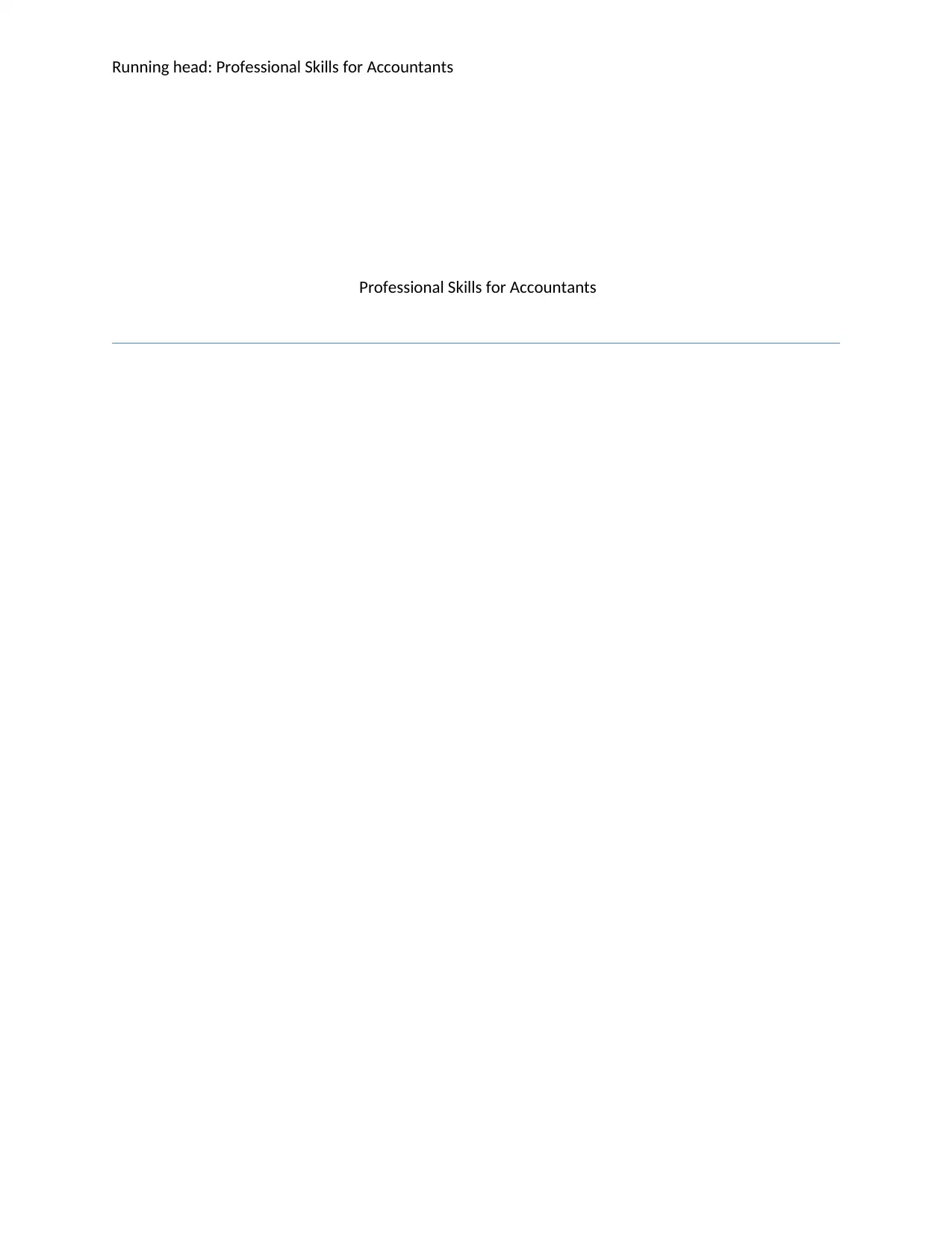
Running head: Professional Skills for Accountants
Professional Skills for Accountants
Professional Skills for Accountants
Paraphrase This Document
Need a fresh take? Get an instant paraphrase of this document with our AI Paraphraser
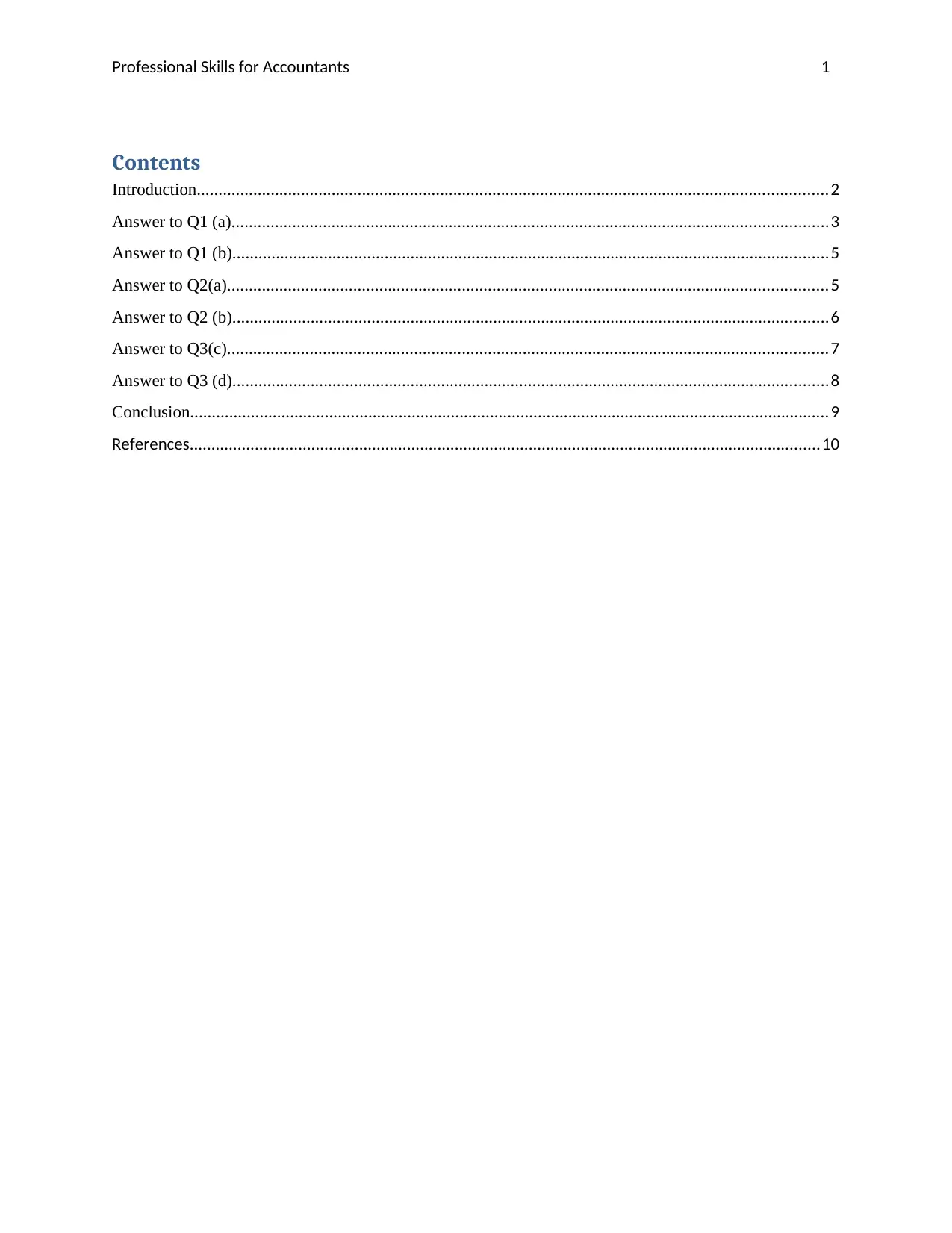
Professional Skills for Accountants 1
Contents
Introduction.................................................................................................................................................2
Answer to Q1 (a).........................................................................................................................................3
Answer to Q1 (b).........................................................................................................................................5
Answer to Q2(a)..........................................................................................................................................5
Answer to Q2 (b).........................................................................................................................................6
Answer to Q3(c)..........................................................................................................................................7
Answer to Q3 (d).........................................................................................................................................8
Conclusion...................................................................................................................................................9
References.................................................................................................................................................10
Contents
Introduction.................................................................................................................................................2
Answer to Q1 (a).........................................................................................................................................3
Answer to Q1 (b).........................................................................................................................................5
Answer to Q2(a)..........................................................................................................................................5
Answer to Q2 (b).........................................................................................................................................6
Answer to Q3(c)..........................................................................................................................................7
Answer to Q3 (d).........................................................................................................................................8
Conclusion...................................................................................................................................................9
References.................................................................................................................................................10
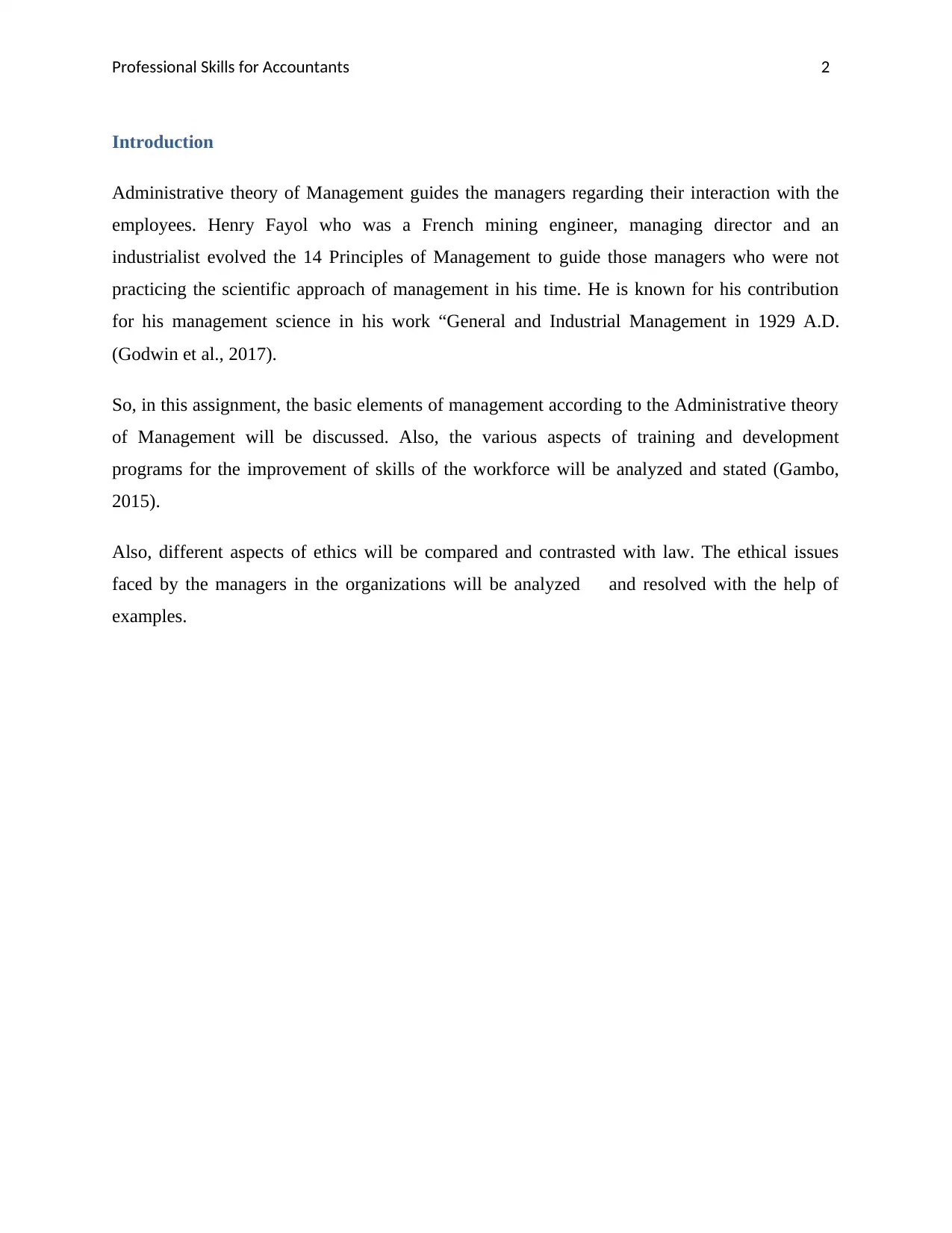
Professional Skills for Accountants 2
Introduction
Administrative theory of Management guides the managers regarding their interaction with the
employees. Henry Fayol who was a French mining engineer, managing director and an
industrialist evolved the 14 Principles of Management to guide those managers who were not
practicing the scientific approach of management in his time. He is known for his contribution
for his management science in his work “General and Industrial Management in 1929 A.D.
(Godwin et al., 2017).
So, in this assignment, the basic elements of management according to the Administrative theory
of Management will be discussed. Also, the various aspects of training and development
programs for the improvement of skills of the workforce will be analyzed and stated (Gambo,
2015).
Also, different aspects of ethics will be compared and contrasted with law. The ethical issues
faced by the managers in the organizations will be analyzed and resolved with the help of
examples.
Introduction
Administrative theory of Management guides the managers regarding their interaction with the
employees. Henry Fayol who was a French mining engineer, managing director and an
industrialist evolved the 14 Principles of Management to guide those managers who were not
practicing the scientific approach of management in his time. He is known for his contribution
for his management science in his work “General and Industrial Management in 1929 A.D.
(Godwin et al., 2017).
So, in this assignment, the basic elements of management according to the Administrative theory
of Management will be discussed. Also, the various aspects of training and development
programs for the improvement of skills of the workforce will be analyzed and stated (Gambo,
2015).
Also, different aspects of ethics will be compared and contrasted with law. The ethical issues
faced by the managers in the organizations will be analyzed and resolved with the help of
examples.
⊘ This is a preview!⊘
Do you want full access?
Subscribe today to unlock all pages.

Trusted by 1+ million students worldwide
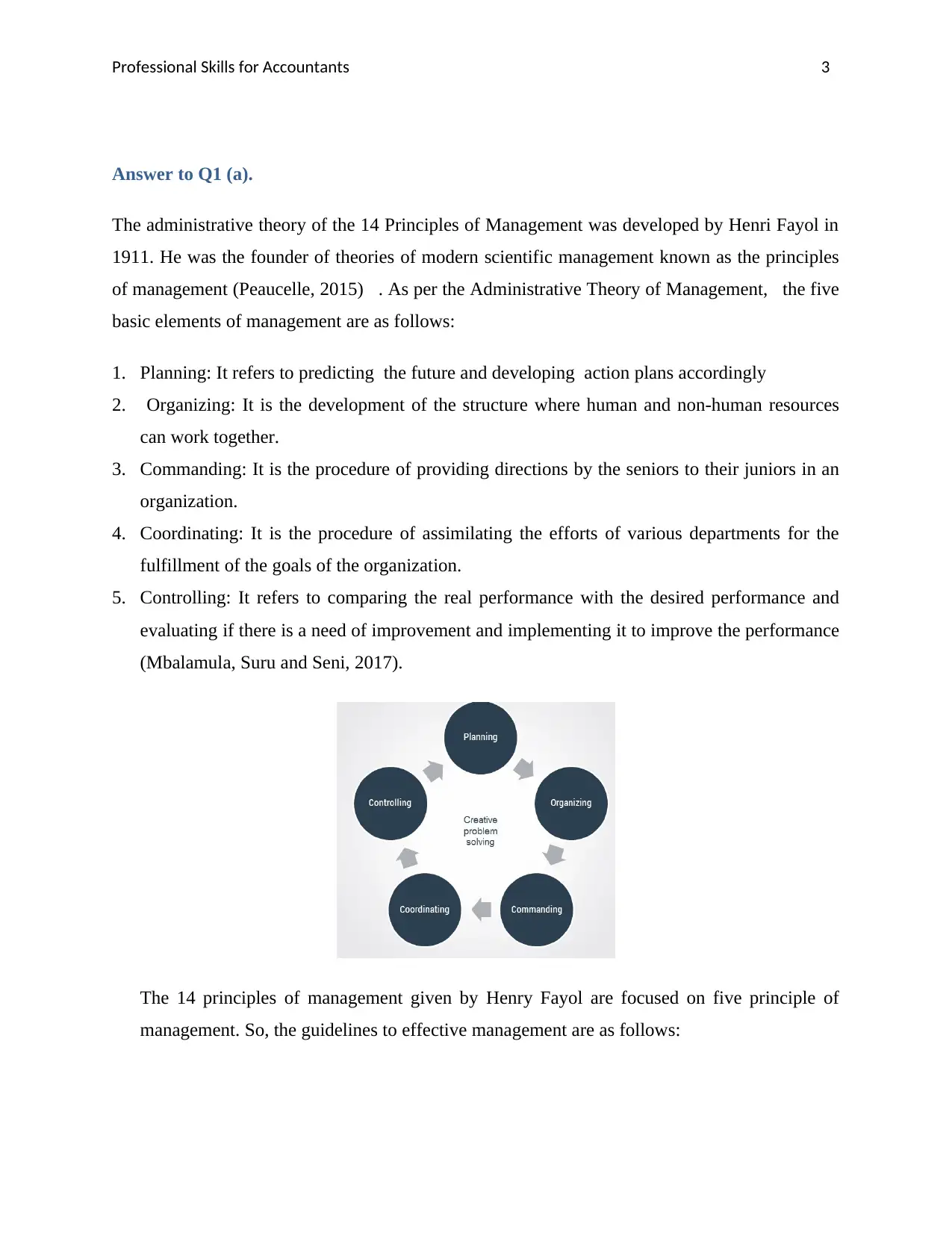
Professional Skills for Accountants 3
Answer to Q1 (a).
The administrative theory of the 14 Principles of Management was developed by Henri Fayol in
1911. He was the founder of theories of modern scientific management known as the principles
of management (Peaucelle, 2015) . As per the Administrative Theory of Management, the five
basic elements of management are as follows:
1. Planning: It refers to predicting the future and developing action plans accordingly
2. Organizing: It is the development of the structure where human and non-human resources
can work together.
3. Commanding: It is the procedure of providing directions by the seniors to their juniors in an
organization.
4. Coordinating: It is the procedure of assimilating the efforts of various departments for the
fulfillment of the goals of the organization.
5. Controlling: It refers to comparing the real performance with the desired performance and
evaluating if there is a need of improvement and implementing it to improve the performance
(Mbalamula, Suru and Seni, 2017).
The 14 principles of management given by Henry Fayol are focused on five principle of
management. So, the guidelines to effective management are as follows:
Answer to Q1 (a).
The administrative theory of the 14 Principles of Management was developed by Henri Fayol in
1911. He was the founder of theories of modern scientific management known as the principles
of management (Peaucelle, 2015) . As per the Administrative Theory of Management, the five
basic elements of management are as follows:
1. Planning: It refers to predicting the future and developing action plans accordingly
2. Organizing: It is the development of the structure where human and non-human resources
can work together.
3. Commanding: It is the procedure of providing directions by the seniors to their juniors in an
organization.
4. Coordinating: It is the procedure of assimilating the efforts of various departments for the
fulfillment of the goals of the organization.
5. Controlling: It refers to comparing the real performance with the desired performance and
evaluating if there is a need of improvement and implementing it to improve the performance
(Mbalamula, Suru and Seni, 2017).
The 14 principles of management given by Henry Fayol are focused on five principle of
management. So, the guidelines to effective management are as follows:
Paraphrase This Document
Need a fresh take? Get an instant paraphrase of this document with our AI Paraphraser
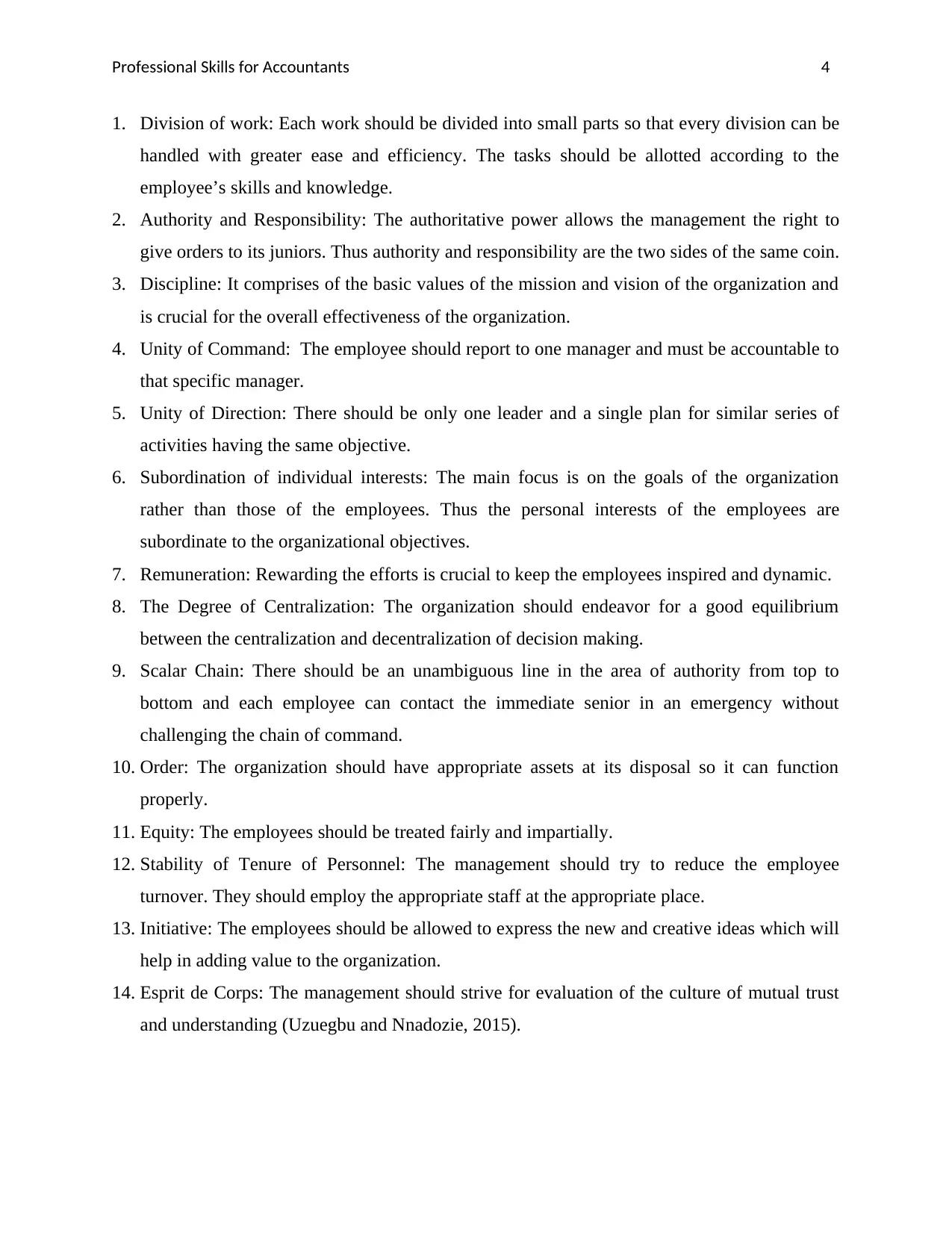
Professional Skills for Accountants 4
1. Division of work: Each work should be divided into small parts so that every division can be
handled with greater ease and efficiency. The tasks should be allotted according to the
employee’s skills and knowledge.
2. Authority and Responsibility: The authoritative power allows the management the right to
give orders to its juniors. Thus authority and responsibility are the two sides of the same coin.
3. Discipline: It comprises of the basic values of the mission and vision of the organization and
is crucial for the overall effectiveness of the organization.
4. Unity of Command: The employee should report to one manager and must be accountable to
that specific manager.
5. Unity of Direction: There should be only one leader and a single plan for similar series of
activities having the same objective.
6. Subordination of individual interests: The main focus is on the goals of the organization
rather than those of the employees. Thus the personal interests of the employees are
subordinate to the organizational objectives.
7. Remuneration: Rewarding the efforts is crucial to keep the employees inspired and dynamic.
8. The Degree of Centralization: The organization should endeavor for a good equilibrium
between the centralization and decentralization of decision making.
9. Scalar Chain: There should be an unambiguous line in the area of authority from top to
bottom and each employee can contact the immediate senior in an emergency without
challenging the chain of command.
10. Order: The organization should have appropriate assets at its disposal so it can function
properly.
11. Equity: The employees should be treated fairly and impartially.
12. Stability of Tenure of Personnel: The management should try to reduce the employee
turnover. They should employ the appropriate staff at the appropriate place.
13. Initiative: The employees should be allowed to express the new and creative ideas which will
help in adding value to the organization.
14. Esprit de Corps: The management should strive for evaluation of the culture of mutual trust
and understanding (Uzuegbu and Nnadozie, 2015).
1. Division of work: Each work should be divided into small parts so that every division can be
handled with greater ease and efficiency. The tasks should be allotted according to the
employee’s skills and knowledge.
2. Authority and Responsibility: The authoritative power allows the management the right to
give orders to its juniors. Thus authority and responsibility are the two sides of the same coin.
3. Discipline: It comprises of the basic values of the mission and vision of the organization and
is crucial for the overall effectiveness of the organization.
4. Unity of Command: The employee should report to one manager and must be accountable to
that specific manager.
5. Unity of Direction: There should be only one leader and a single plan for similar series of
activities having the same objective.
6. Subordination of individual interests: The main focus is on the goals of the organization
rather than those of the employees. Thus the personal interests of the employees are
subordinate to the organizational objectives.
7. Remuneration: Rewarding the efforts is crucial to keep the employees inspired and dynamic.
8. The Degree of Centralization: The organization should endeavor for a good equilibrium
between the centralization and decentralization of decision making.
9. Scalar Chain: There should be an unambiguous line in the area of authority from top to
bottom and each employee can contact the immediate senior in an emergency without
challenging the chain of command.
10. Order: The organization should have appropriate assets at its disposal so it can function
properly.
11. Equity: The employees should be treated fairly and impartially.
12. Stability of Tenure of Personnel: The management should try to reduce the employee
turnover. They should employ the appropriate staff at the appropriate place.
13. Initiative: The employees should be allowed to express the new and creative ideas which will
help in adding value to the organization.
14. Esprit de Corps: The management should strive for evaluation of the culture of mutual trust
and understanding (Uzuegbu and Nnadozie, 2015).
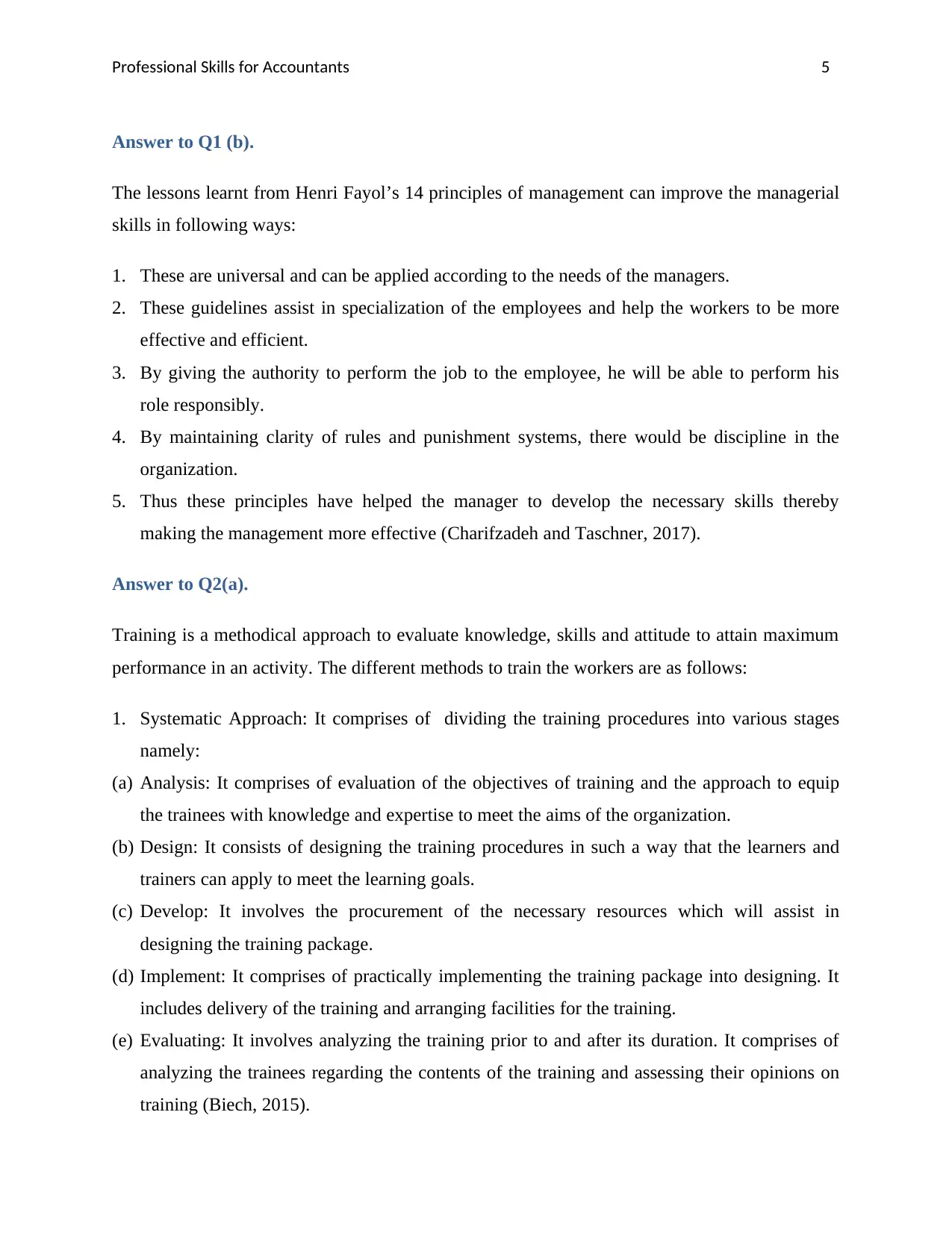
Professional Skills for Accountants 5
Answer to Q1 (b).
The lessons learnt from Henri Fayol’s 14 principles of management can improve the managerial
skills in following ways:
1. These are universal and can be applied according to the needs of the managers.
2. These guidelines assist in specialization of the employees and help the workers to be more
effective and efficient.
3. By giving the authority to perform the job to the employee, he will be able to perform his
role responsibly.
4. By maintaining clarity of rules and punishment systems, there would be discipline in the
organization.
5. Thus these principles have helped the manager to develop the necessary skills thereby
making the management more effective (Charifzadeh and Taschner, 2017).
Answer to Q2(a).
Training is a methodical approach to evaluate knowledge, skills and attitude to attain maximum
performance in an activity. The different methods to train the workers are as follows:
1. Systematic Approach: It comprises of dividing the training procedures into various stages
namely:
(a) Analysis: It comprises of evaluation of the objectives of training and the approach to equip
the trainees with knowledge and expertise to meet the aims of the organization.
(b) Design: It consists of designing the training procedures in such a way that the learners and
trainers can apply to meet the learning goals.
(c) Develop: It involves the procurement of the necessary resources which will assist in
designing the training package.
(d) Implement: It comprises of practically implementing the training package into designing. It
includes delivery of the training and arranging facilities for the training.
(e) Evaluating: It involves analyzing the training prior to and after its duration. It comprises of
analyzing the trainees regarding the contents of the training and assessing their opinions on
training (Biech, 2015).
Answer to Q1 (b).
The lessons learnt from Henri Fayol’s 14 principles of management can improve the managerial
skills in following ways:
1. These are universal and can be applied according to the needs of the managers.
2. These guidelines assist in specialization of the employees and help the workers to be more
effective and efficient.
3. By giving the authority to perform the job to the employee, he will be able to perform his
role responsibly.
4. By maintaining clarity of rules and punishment systems, there would be discipline in the
organization.
5. Thus these principles have helped the manager to develop the necessary skills thereby
making the management more effective (Charifzadeh and Taschner, 2017).
Answer to Q2(a).
Training is a methodical approach to evaluate knowledge, skills and attitude to attain maximum
performance in an activity. The different methods to train the workers are as follows:
1. Systematic Approach: It comprises of dividing the training procedures into various stages
namely:
(a) Analysis: It comprises of evaluation of the objectives of training and the approach to equip
the trainees with knowledge and expertise to meet the aims of the organization.
(b) Design: It consists of designing the training procedures in such a way that the learners and
trainers can apply to meet the learning goals.
(c) Develop: It involves the procurement of the necessary resources which will assist in
designing the training package.
(d) Implement: It comprises of practically implementing the training package into designing. It
includes delivery of the training and arranging facilities for the training.
(e) Evaluating: It involves analyzing the training prior to and after its duration. It comprises of
analyzing the trainees regarding the contents of the training and assessing their opinions on
training (Biech, 2015).
⊘ This is a preview!⊘
Do you want full access?
Subscribe today to unlock all pages.

Trusted by 1+ million students worldwide
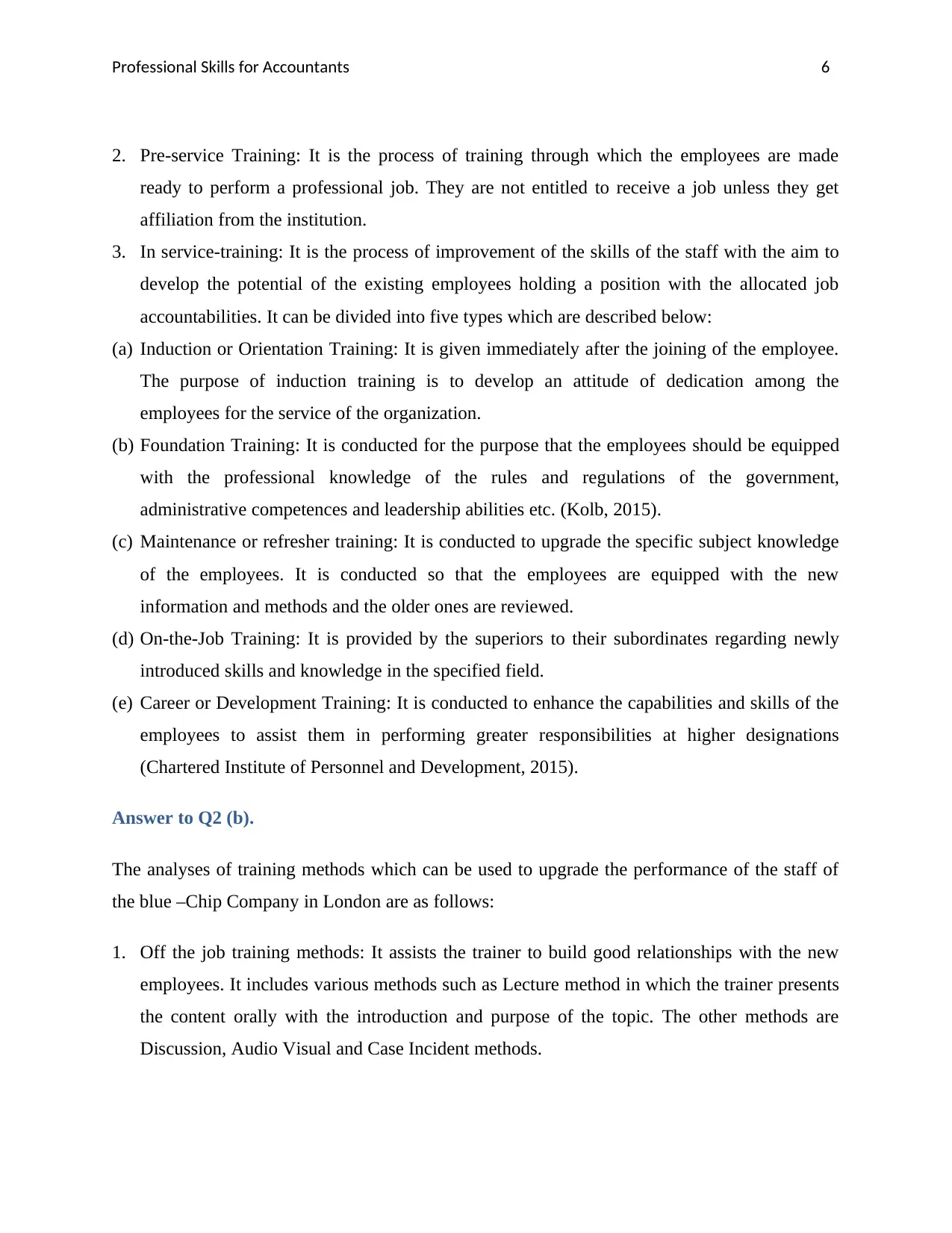
Professional Skills for Accountants 6
2. Pre-service Training: It is the process of training through which the employees are made
ready to perform a professional job. They are not entitled to receive a job unless they get
affiliation from the institution.
3. In service-training: It is the process of improvement of the skills of the staff with the aim to
develop the potential of the existing employees holding a position with the allocated job
accountabilities. It can be divided into five types which are described below:
(a) Induction or Orientation Training: It is given immediately after the joining of the employee.
The purpose of induction training is to develop an attitude of dedication among the
employees for the service of the organization.
(b) Foundation Training: It is conducted for the purpose that the employees should be equipped
with the professional knowledge of the rules and regulations of the government,
administrative competences and leadership abilities etc. (Kolb, 2015).
(c) Maintenance or refresher training: It is conducted to upgrade the specific subject knowledge
of the employees. It is conducted so that the employees are equipped with the new
information and methods and the older ones are reviewed.
(d) On-the-Job Training: It is provided by the superiors to their subordinates regarding newly
introduced skills and knowledge in the specified field.
(e) Career or Development Training: It is conducted to enhance the capabilities and skills of the
employees to assist them in performing greater responsibilities at higher designations
(Chartered Institute of Personnel and Development, 2015).
Answer to Q2 (b).
The analyses of training methods which can be used to upgrade the performance of the staff of
the blue –Chip Company in London are as follows:
1. Off the job training methods: It assists the trainer to build good relationships with the new
employees. It includes various methods such as Lecture method in which the trainer presents
the content orally with the introduction and purpose of the topic. The other methods are
Discussion, Audio Visual and Case Incident methods.
2. Pre-service Training: It is the process of training through which the employees are made
ready to perform a professional job. They are not entitled to receive a job unless they get
affiliation from the institution.
3. In service-training: It is the process of improvement of the skills of the staff with the aim to
develop the potential of the existing employees holding a position with the allocated job
accountabilities. It can be divided into five types which are described below:
(a) Induction or Orientation Training: It is given immediately after the joining of the employee.
The purpose of induction training is to develop an attitude of dedication among the
employees for the service of the organization.
(b) Foundation Training: It is conducted for the purpose that the employees should be equipped
with the professional knowledge of the rules and regulations of the government,
administrative competences and leadership abilities etc. (Kolb, 2015).
(c) Maintenance or refresher training: It is conducted to upgrade the specific subject knowledge
of the employees. It is conducted so that the employees are equipped with the new
information and methods and the older ones are reviewed.
(d) On-the-Job Training: It is provided by the superiors to their subordinates regarding newly
introduced skills and knowledge in the specified field.
(e) Career or Development Training: It is conducted to enhance the capabilities and skills of the
employees to assist them in performing greater responsibilities at higher designations
(Chartered Institute of Personnel and Development, 2015).
Answer to Q2 (b).
The analyses of training methods which can be used to upgrade the performance of the staff of
the blue –Chip Company in London are as follows:
1. Off the job training methods: It assists the trainer to build good relationships with the new
employees. It includes various methods such as Lecture method in which the trainer presents
the content orally with the introduction and purpose of the topic. The other methods are
Discussion, Audio Visual and Case Incident methods.
Paraphrase This Document
Need a fresh take? Get an instant paraphrase of this document with our AI Paraphraser
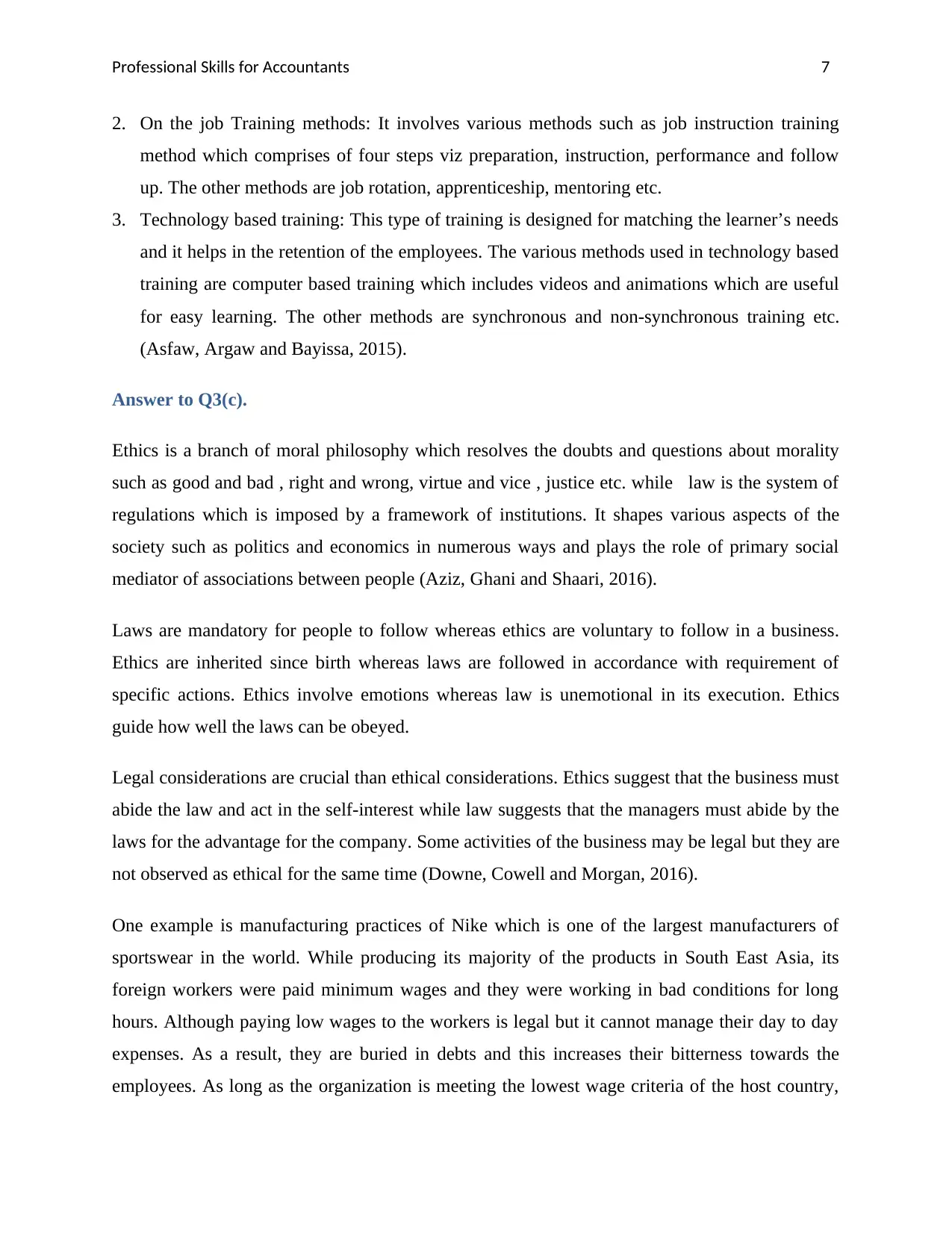
Professional Skills for Accountants 7
2. On the job Training methods: It involves various methods such as job instruction training
method which comprises of four steps viz preparation, instruction, performance and follow
up. The other methods are job rotation, apprenticeship, mentoring etc.
3. Technology based training: This type of training is designed for matching the learner’s needs
and it helps in the retention of the employees. The various methods used in technology based
training are computer based training which includes videos and animations which are useful
for easy learning. The other methods are synchronous and non-synchronous training etc.
(Asfaw, Argaw and Bayissa, 2015).
Answer to Q3(c).
Ethics is a branch of moral philosophy which resolves the doubts and questions about morality
such as good and bad , right and wrong, virtue and vice , justice etc. while law is the system of
regulations which is imposed by a framework of institutions. It shapes various aspects of the
society such as politics and economics in numerous ways and plays the role of primary social
mediator of associations between people (Aziz, Ghani and Shaari, 2016).
Laws are mandatory for people to follow whereas ethics are voluntary to follow in a business.
Ethics are inherited since birth whereas laws are followed in accordance with requirement of
specific actions. Ethics involve emotions whereas law is unemotional in its execution. Ethics
guide how well the laws can be obeyed.
Legal considerations are crucial than ethical considerations. Ethics suggest that the business must
abide the law and act in the self-interest while law suggests that the managers must abide by the
laws for the advantage for the company. Some activities of the business may be legal but they are
not observed as ethical for the same time (Downe, Cowell and Morgan, 2016).
One example is manufacturing practices of Nike which is one of the largest manufacturers of
sportswear in the world. While producing its majority of the products in South East Asia, its
foreign workers were paid minimum wages and they were working in bad conditions for long
hours. Although paying low wages to the workers is legal but it cannot manage their day to day
expenses. As a result, they are buried in debts and this increases their bitterness towards the
employees. As long as the organization is meeting the lowest wage criteria of the host country,
2. On the job Training methods: It involves various methods such as job instruction training
method which comprises of four steps viz preparation, instruction, performance and follow
up. The other methods are job rotation, apprenticeship, mentoring etc.
3. Technology based training: This type of training is designed for matching the learner’s needs
and it helps in the retention of the employees. The various methods used in technology based
training are computer based training which includes videos and animations which are useful
for easy learning. The other methods are synchronous and non-synchronous training etc.
(Asfaw, Argaw and Bayissa, 2015).
Answer to Q3(c).
Ethics is a branch of moral philosophy which resolves the doubts and questions about morality
such as good and bad , right and wrong, virtue and vice , justice etc. while law is the system of
regulations which is imposed by a framework of institutions. It shapes various aspects of the
society such as politics and economics in numerous ways and plays the role of primary social
mediator of associations between people (Aziz, Ghani and Shaari, 2016).
Laws are mandatory for people to follow whereas ethics are voluntary to follow in a business.
Ethics are inherited since birth whereas laws are followed in accordance with requirement of
specific actions. Ethics involve emotions whereas law is unemotional in its execution. Ethics
guide how well the laws can be obeyed.
Legal considerations are crucial than ethical considerations. Ethics suggest that the business must
abide the law and act in the self-interest while law suggests that the managers must abide by the
laws for the advantage for the company. Some activities of the business may be legal but they are
not observed as ethical for the same time (Downe, Cowell and Morgan, 2016).
One example is manufacturing practices of Nike which is one of the largest manufacturers of
sportswear in the world. While producing its majority of the products in South East Asia, its
foreign workers were paid minimum wages and they were working in bad conditions for long
hours. Although paying low wages to the workers is legal but it cannot manage their day to day
expenses. As a result, they are buried in debts and this increases their bitterness towards the
employees. As long as the organization is meeting the lowest wage criteria of the host country,
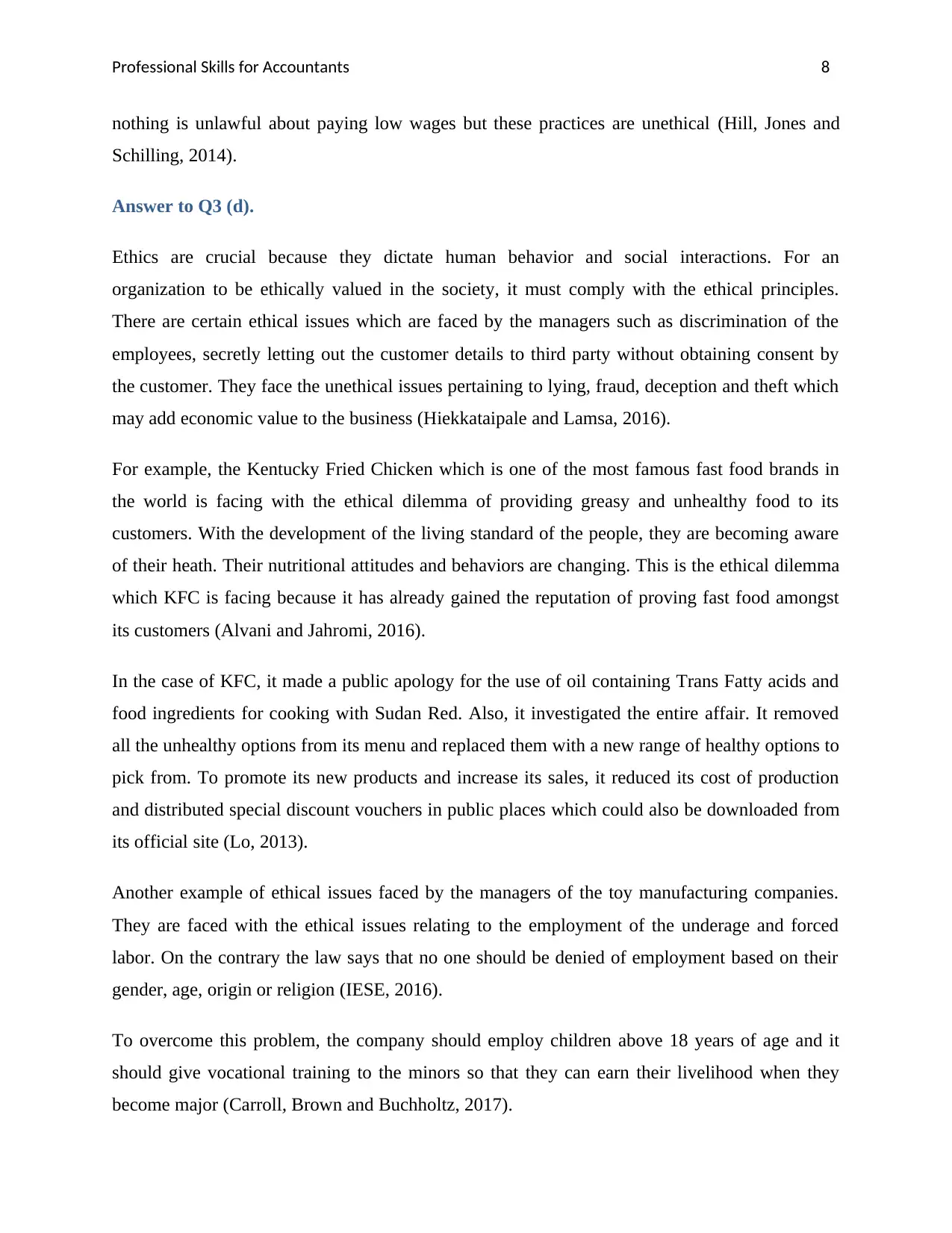
Professional Skills for Accountants 8
nothing is unlawful about paying low wages but these practices are unethical (Hill, Jones and
Schilling, 2014).
Answer to Q3 (d).
Ethics are crucial because they dictate human behavior and social interactions. For an
organization to be ethically valued in the society, it must comply with the ethical principles.
There are certain ethical issues which are faced by the managers such as discrimination of the
employees, secretly letting out the customer details to third party without obtaining consent by
the customer. They face the unethical issues pertaining to lying, fraud, deception and theft which
may add economic value to the business (Hiekkataipale and Lamsa, 2016).
For example, the Kentucky Fried Chicken which is one of the most famous fast food brands in
the world is facing with the ethical dilemma of providing greasy and unhealthy food to its
customers. With the development of the living standard of the people, they are becoming aware
of their heath. Their nutritional attitudes and behaviors are changing. This is the ethical dilemma
which KFC is facing because it has already gained the reputation of proving fast food amongst
its customers (Alvani and Jahromi, 2016).
In the case of KFC, it made a public apology for the use of oil containing Trans Fatty acids and
food ingredients for cooking with Sudan Red. Also, it investigated the entire affair. It removed
all the unhealthy options from its menu and replaced them with a new range of healthy options to
pick from. To promote its new products and increase its sales, it reduced its cost of production
and distributed special discount vouchers in public places which could also be downloaded from
its official site (Lo, 2013).
Another example of ethical issues faced by the managers of the toy manufacturing companies.
They are faced with the ethical issues relating to the employment of the underage and forced
labor. On the contrary the law says that no one should be denied of employment based on their
gender, age, origin or religion (IESE, 2016).
To overcome this problem, the company should employ children above 18 years of age and it
should give vocational training to the minors so that they can earn their livelihood when they
become major (Carroll, Brown and Buchholtz, 2017).
nothing is unlawful about paying low wages but these practices are unethical (Hill, Jones and
Schilling, 2014).
Answer to Q3 (d).
Ethics are crucial because they dictate human behavior and social interactions. For an
organization to be ethically valued in the society, it must comply with the ethical principles.
There are certain ethical issues which are faced by the managers such as discrimination of the
employees, secretly letting out the customer details to third party without obtaining consent by
the customer. They face the unethical issues pertaining to lying, fraud, deception and theft which
may add economic value to the business (Hiekkataipale and Lamsa, 2016).
For example, the Kentucky Fried Chicken which is one of the most famous fast food brands in
the world is facing with the ethical dilemma of providing greasy and unhealthy food to its
customers. With the development of the living standard of the people, they are becoming aware
of their heath. Their nutritional attitudes and behaviors are changing. This is the ethical dilemma
which KFC is facing because it has already gained the reputation of proving fast food amongst
its customers (Alvani and Jahromi, 2016).
In the case of KFC, it made a public apology for the use of oil containing Trans Fatty acids and
food ingredients for cooking with Sudan Red. Also, it investigated the entire affair. It removed
all the unhealthy options from its menu and replaced them with a new range of healthy options to
pick from. To promote its new products and increase its sales, it reduced its cost of production
and distributed special discount vouchers in public places which could also be downloaded from
its official site (Lo, 2013).
Another example of ethical issues faced by the managers of the toy manufacturing companies.
They are faced with the ethical issues relating to the employment of the underage and forced
labor. On the contrary the law says that no one should be denied of employment based on their
gender, age, origin or religion (IESE, 2016).
To overcome this problem, the company should employ children above 18 years of age and it
should give vocational training to the minors so that they can earn their livelihood when they
become major (Carroll, Brown and Buchholtz, 2017).
⊘ This is a preview!⊘
Do you want full access?
Subscribe today to unlock all pages.

Trusted by 1+ million students worldwide
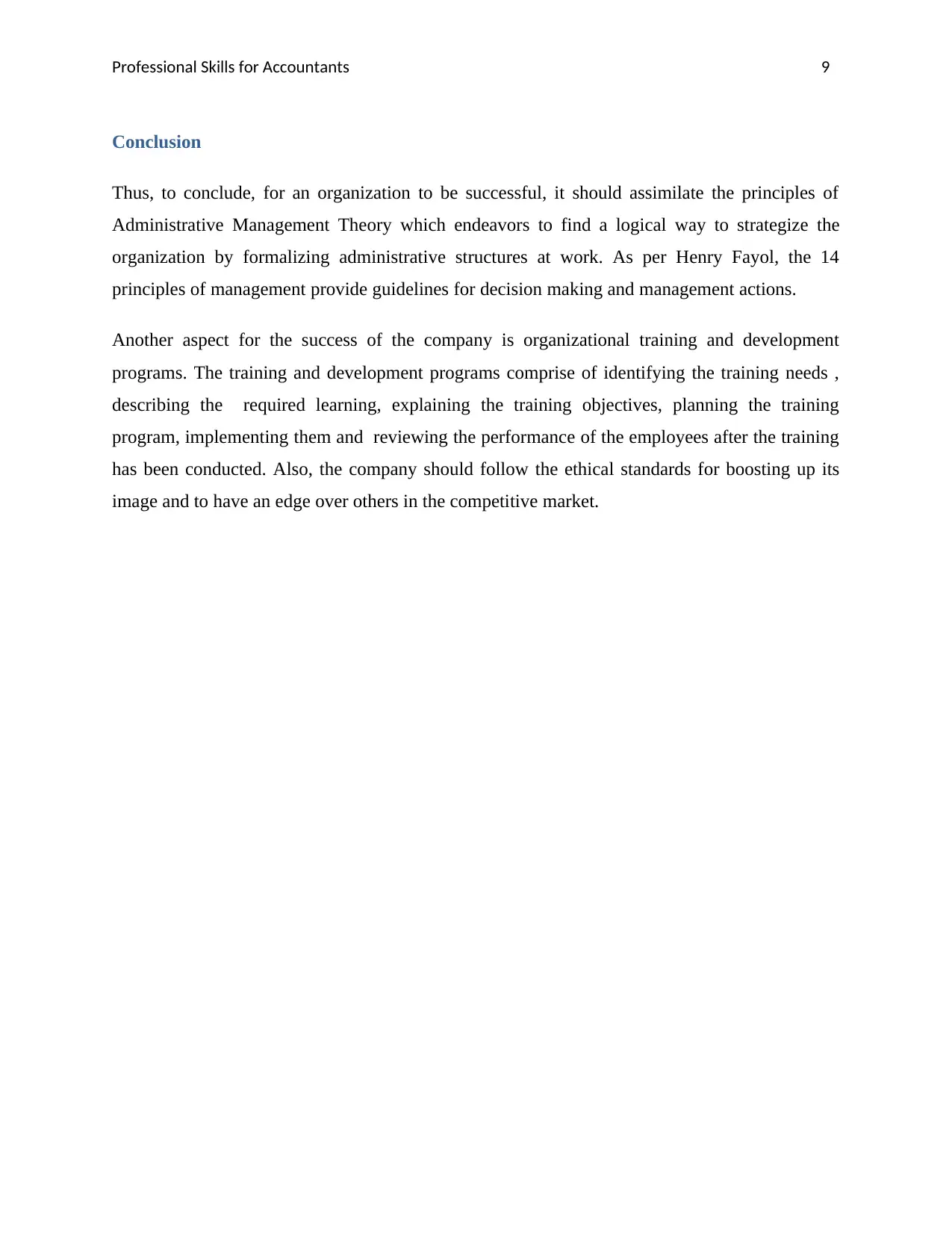
Professional Skills for Accountants 9
Conclusion
Thus, to conclude, for an organization to be successful, it should assimilate the principles of
Administrative Management Theory which endeavors to find a logical way to strategize the
organization by formalizing administrative structures at work. As per Henry Fayol, the 14
principles of management provide guidelines for decision making and management actions.
Another aspect for the success of the company is organizational training and development
programs. The training and development programs comprise of identifying the training needs ,
describing the required learning, explaining the training objectives, planning the training
program, implementing them and reviewing the performance of the employees after the training
has been conducted. Also, the company should follow the ethical standards for boosting up its
image and to have an edge over others in the competitive market.
Conclusion
Thus, to conclude, for an organization to be successful, it should assimilate the principles of
Administrative Management Theory which endeavors to find a logical way to strategize the
organization by formalizing administrative structures at work. As per Henry Fayol, the 14
principles of management provide guidelines for decision making and management actions.
Another aspect for the success of the company is organizational training and development
programs. The training and development programs comprise of identifying the training needs ,
describing the required learning, explaining the training objectives, planning the training
program, implementing them and reviewing the performance of the employees after the training
has been conducted. Also, the company should follow the ethical standards for boosting up its
image and to have an edge over others in the competitive market.
Paraphrase This Document
Need a fresh take? Get an instant paraphrase of this document with our AI Paraphraser
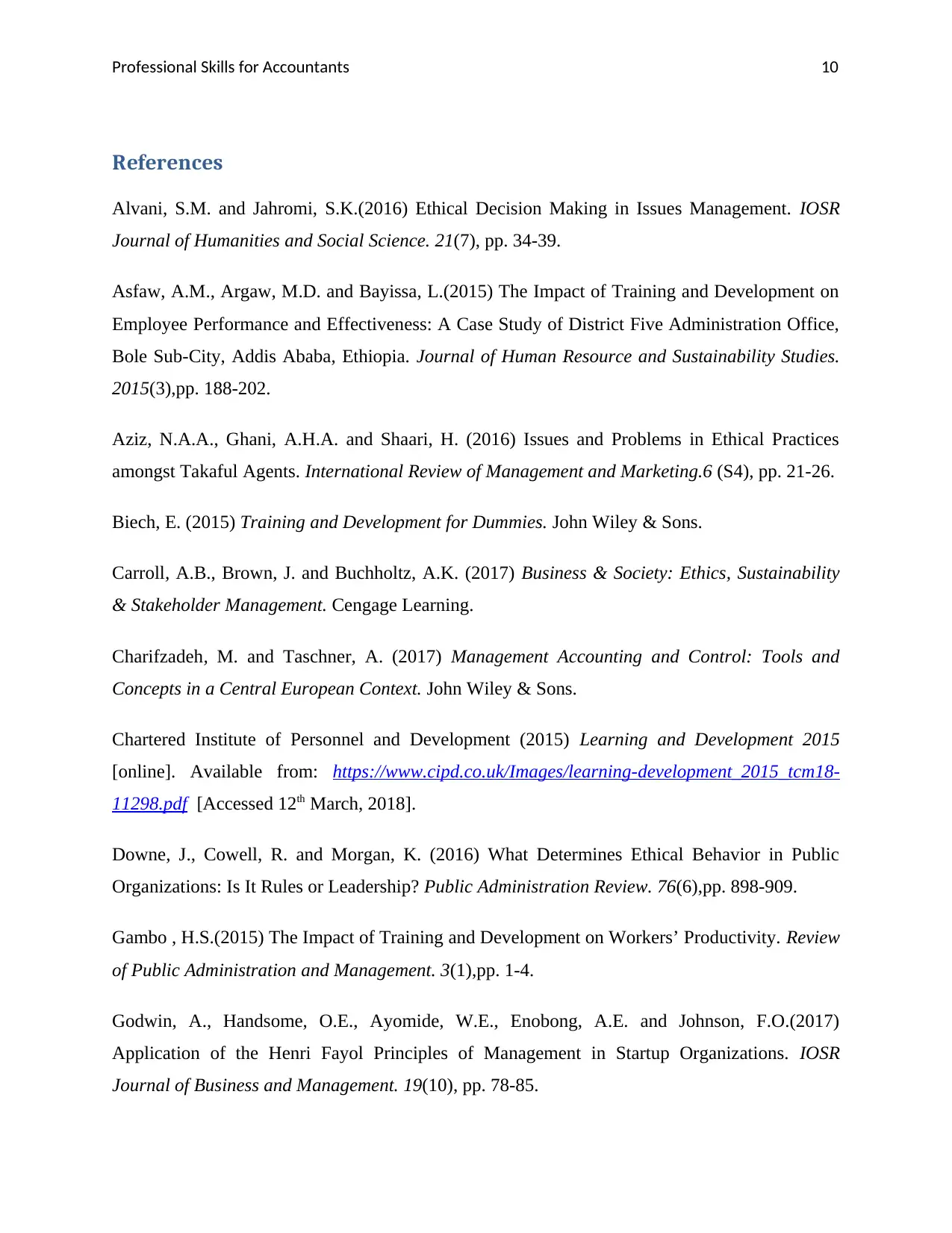
Professional Skills for Accountants 10
References
Alvani, S.M. and Jahromi, S.K.(2016) Ethical Decision Making in Issues Management. IOSR
Journal of Humanities and Social Science. 21(7), pp. 34-39.
Asfaw, A.M., Argaw, M.D. and Bayissa, L.(2015) The Impact of Training and Development on
Employee Performance and Effectiveness: A Case Study of District Five Administration Office,
Bole Sub-City, Addis Ababa, Ethiopia. Journal of Human Resource and Sustainability Studies.
2015(3),pp. 188-202.
Aziz, N.A.A., Ghani, A.H.A. and Shaari, H. (2016) Issues and Problems in Ethical Practices
amongst Takaful Agents. International Review of Management and Marketing.6 (S4), pp. 21-26.
Biech, E. (2015) Training and Development for Dummies. John Wiley & Sons.
Carroll, A.B., Brown, J. and Buchholtz, A.K. (2017) Business & Society: Ethics, Sustainability
& Stakeholder Management. Cengage Learning.
Charifzadeh, M. and Taschner, A. (2017) Management Accounting and Control: Tools and
Concepts in a Central European Context. John Wiley & Sons.
Chartered Institute of Personnel and Development (2015) Learning and Development 2015
[online]. Available from: https://www.cipd.co.uk/Images/learning-development_2015_tcm18-
11298.pdf [Accessed 12th March, 2018].
Downe, J., Cowell, R. and Morgan, K. (2016) What Determines Ethical Behavior in Public
Organizations: Is It Rules or Leadership? Public Administration Review. 76(6),pp. 898-909.
Gambo , H.S.(2015) The Impact of Training and Development on Workers’ Productivity. Review
of Public Administration and Management. 3(1),pp. 1-4.
Godwin, A., Handsome, O.E., Ayomide, W.E., Enobong, A.E. and Johnson, F.O.(2017)
Application of the Henri Fayol Principles of Management in Startup Organizations. IOSR
Journal of Business and Management. 19(10), pp. 78-85.
References
Alvani, S.M. and Jahromi, S.K.(2016) Ethical Decision Making in Issues Management. IOSR
Journal of Humanities and Social Science. 21(7), pp. 34-39.
Asfaw, A.M., Argaw, M.D. and Bayissa, L.(2015) The Impact of Training and Development on
Employee Performance and Effectiveness: A Case Study of District Five Administration Office,
Bole Sub-City, Addis Ababa, Ethiopia. Journal of Human Resource and Sustainability Studies.
2015(3),pp. 188-202.
Aziz, N.A.A., Ghani, A.H.A. and Shaari, H. (2016) Issues and Problems in Ethical Practices
amongst Takaful Agents. International Review of Management and Marketing.6 (S4), pp. 21-26.
Biech, E. (2015) Training and Development for Dummies. John Wiley & Sons.
Carroll, A.B., Brown, J. and Buchholtz, A.K. (2017) Business & Society: Ethics, Sustainability
& Stakeholder Management. Cengage Learning.
Charifzadeh, M. and Taschner, A. (2017) Management Accounting and Control: Tools and
Concepts in a Central European Context. John Wiley & Sons.
Chartered Institute of Personnel and Development (2015) Learning and Development 2015
[online]. Available from: https://www.cipd.co.uk/Images/learning-development_2015_tcm18-
11298.pdf [Accessed 12th March, 2018].
Downe, J., Cowell, R. and Morgan, K. (2016) What Determines Ethical Behavior in Public
Organizations: Is It Rules or Leadership? Public Administration Review. 76(6),pp. 898-909.
Gambo , H.S.(2015) The Impact of Training and Development on Workers’ Productivity. Review
of Public Administration and Management. 3(1),pp. 1-4.
Godwin, A., Handsome, O.E., Ayomide, W.E., Enobong, A.E. and Johnson, F.O.(2017)
Application of the Henri Fayol Principles of Management in Startup Organizations. IOSR
Journal of Business and Management. 19(10), pp. 78-85.
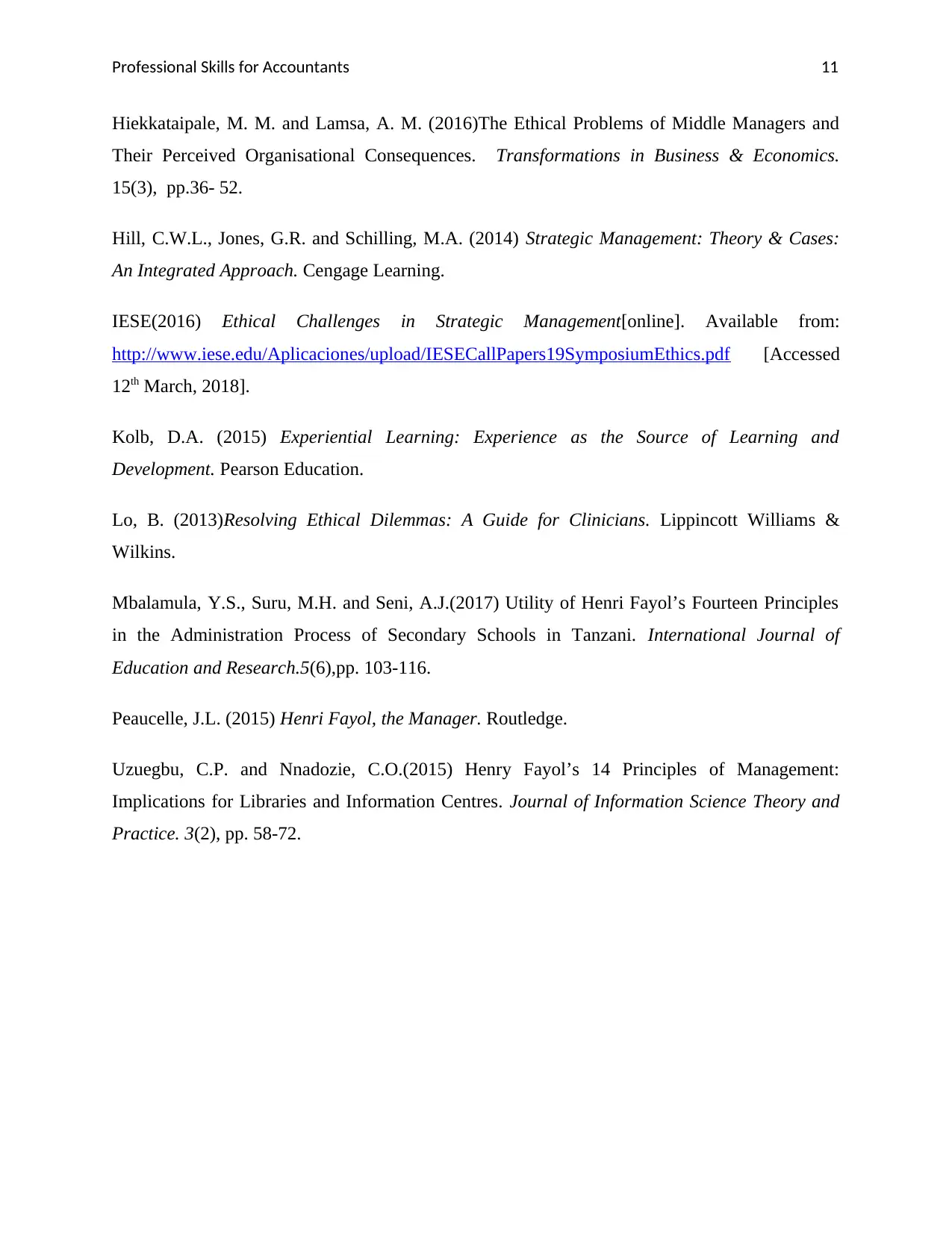
Professional Skills for Accountants 11
Hiekkataipale, M. M. and Lamsa, A. M. (2016)The Ethical Problems of Middle Managers and
Their Perceived Organisational Consequences. Transformations in Business & Economics.
15(3), pp.36- 52.
Hill, C.W.L., Jones, G.R. and Schilling, M.A. (2014) Strategic Management: Theory & Cases:
An Integrated Approach. Cengage Learning.
IESE(2016) Ethical Challenges in Strategic Management[online]. Available from:
http://www.iese.edu/Aplicaciones/upload/IESECallPapers19SymposiumEthics.pdf [Accessed
12th March, 2018].
Kolb, D.A. (2015) Experiential Learning: Experience as the Source of Learning and
Development. Pearson Education.
Lo, B. (2013)Resolving Ethical Dilemmas: A Guide for Clinicians. Lippincott Williams &
Wilkins.
Mbalamula, Y.S., Suru, M.H. and Seni, A.J.(2017) Utility of Henri Fayol’s Fourteen Principles
in the Administration Process of Secondary Schools in Tanzani. International Journal of
Education and Research.5(6),pp. 103-116.
Peaucelle, J.L. (2015) Henri Fayol, the Manager. Routledge.
Uzuegbu, C.P. and Nnadozie, C.O.(2015) Henry Fayol’s 14 Principles of Management:
Implications for Libraries and Information Centres. Journal of Information Science Theory and
Practice. 3(2), pp. 58-72.
Hiekkataipale, M. M. and Lamsa, A. M. (2016)The Ethical Problems of Middle Managers and
Their Perceived Organisational Consequences. Transformations in Business & Economics.
15(3), pp.36- 52.
Hill, C.W.L., Jones, G.R. and Schilling, M.A. (2014) Strategic Management: Theory & Cases:
An Integrated Approach. Cengage Learning.
IESE(2016) Ethical Challenges in Strategic Management[online]. Available from:
http://www.iese.edu/Aplicaciones/upload/IESECallPapers19SymposiumEthics.pdf [Accessed
12th March, 2018].
Kolb, D.A. (2015) Experiential Learning: Experience as the Source of Learning and
Development. Pearson Education.
Lo, B. (2013)Resolving Ethical Dilemmas: A Guide for Clinicians. Lippincott Williams &
Wilkins.
Mbalamula, Y.S., Suru, M.H. and Seni, A.J.(2017) Utility of Henri Fayol’s Fourteen Principles
in the Administration Process of Secondary Schools in Tanzani. International Journal of
Education and Research.5(6),pp. 103-116.
Peaucelle, J.L. (2015) Henri Fayol, the Manager. Routledge.
Uzuegbu, C.P. and Nnadozie, C.O.(2015) Henry Fayol’s 14 Principles of Management:
Implications for Libraries and Information Centres. Journal of Information Science Theory and
Practice. 3(2), pp. 58-72.
⊘ This is a preview!⊘
Do you want full access?
Subscribe today to unlock all pages.

Trusted by 1+ million students worldwide
1 out of 12
Related Documents
Your All-in-One AI-Powered Toolkit for Academic Success.
+13062052269
info@desklib.com
Available 24*7 on WhatsApp / Email
![[object Object]](/_next/static/media/star-bottom.7253800d.svg)
Unlock your academic potential
Copyright © 2020–2026 A2Z Services. All Rights Reserved. Developed and managed by ZUCOL.





